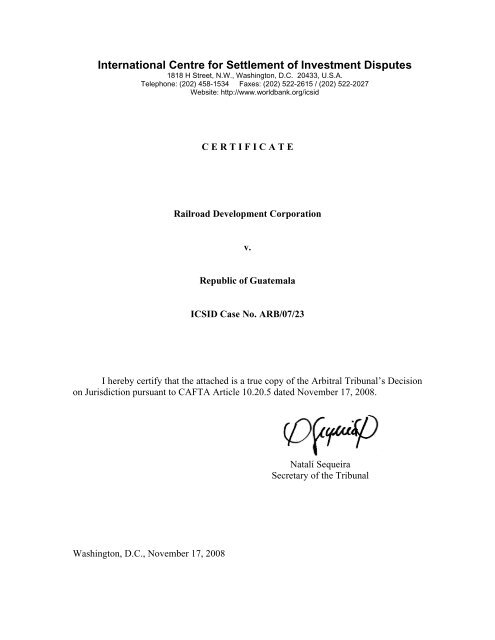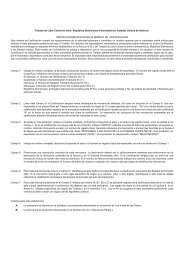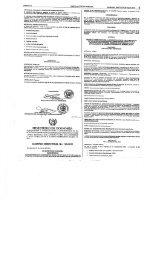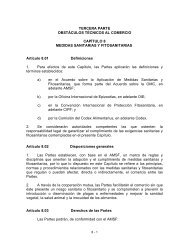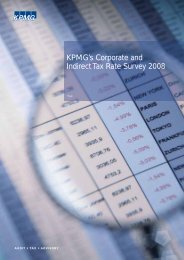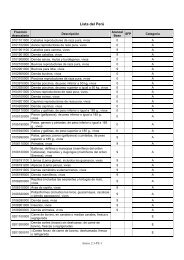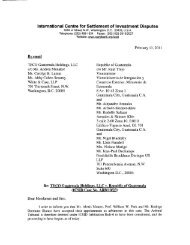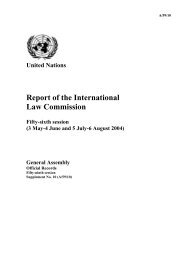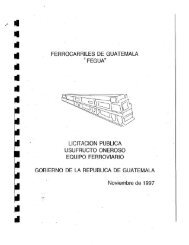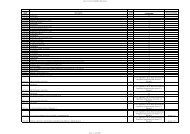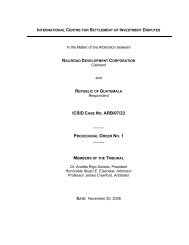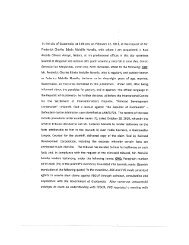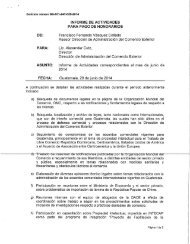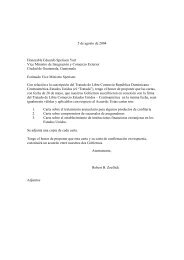Decision on Objection to Jurisdiction
Decision on Objection to Jurisdiction
Decision on Objection to Jurisdiction
You also want an ePaper? Increase the reach of your titles
YUMPU automatically turns print PDFs into web optimized ePapers that Google loves.
Internati<strong>on</strong>al Centre for Settlement of Investment Disputes1818 H Street, N.W., Washingt<strong>on</strong>, D.C. 20433, U.S.A.Teleph<strong>on</strong>e: (202) 458-1534 Faxes: (202) 522-2615 / (202) 522-2027Website: http://www.worldbank.org/icsidC E R T I F I C A T ERailroad Development Corporati<strong>on</strong>v.Republic of GuatemalaICSID Case No. ARB/07/23I hereby certify that the attached is a true copy of the Arbitral Tribunal’s <str<strong>on</strong>g>Decisi<strong>on</strong></str<strong>on</strong>g><strong>on</strong> Jurisdicti<strong>on</strong> pursuant <strong>to</strong> CAFTA Article 10.20.5 dated November 17, 2008.Natalí SequeiraSecretary of the TribunalWashingt<strong>on</strong>, D.C., November 17, 2008
INTERNATIONAL CENTRE FOR SETTLEMENT OF INVESTMENT DISPUTESIn the Matter of the Arbitrati<strong>on</strong> betweenRAILROAD DEVELOPMENT CORPORATIONClaimantandREPUBLIC OF GUATEMALAResp<strong>on</strong>dentICSID CASE NO. ARB/07/23DECISION ON OBJECTION TO JURISDICTIONCAFTA ARTICLE 10.20.5MEMBERS OF THE TRIBUNALDr. Andrés Rigo Sureda, PresidentH<strong>on</strong>orable Stuart E. Eizenstat, Arbitra<strong>to</strong>rProfessor James Crawford, Arbitra<strong>to</strong>rSECRETARY OF THE TRIBUNALNatalí SequeiraDATE: November 17, 2008
TABLE OF CONTENTSI. PROCEDURAL BACKGROUND........................................................... 3II. THE ARBITRATION REQUEST .......................................................... 4III. THE OBJECTION TO JURISDICTION.................................................. 9IV. THE COUNTER-MEMORIAL............................................................10V. THE REPLY ...................................................................................13VI. THE REJOINDER ...........................................................................16VII. THE TRIBUNAL’S VIEWS ................................................................18A. EXPRESS RESERVATION IN THE WAIVERS.......................................18B. ADEQUACY OF THE WAIVERS ........................................................ 20VIII. DECISION .................................................................................... 322
I. PROCEDURAL BACKGROUND<str<strong>on</strong>g>Decisi<strong>on</strong></str<strong>on</strong>g> <strong>on</strong> Objecti<strong>on</strong> <strong>to</strong> Jurisdicti<strong>on</strong>Under CAFTA Article 10.20.5 11. On June 14, 2007, the Railroad Development Corporati<strong>on</strong> (‘RDC’ or‘Claimant’) filed with the Internati<strong>on</strong>al Centre for Settlement of InvestmentDisputes (‘ICSID’) a Request for the Instituti<strong>on</strong> of Arbitrati<strong>on</strong> Proceedingsagainst the Republic of Guatemala (‘Resp<strong>on</strong>dent’, ‘Guatemala’ or ‘theRepublic’) under Articles 10.16 and 10.17 of the Dominican Republic –Central America – United States of America Free Trade Agreement(‘CAFTA’) 2 <strong>on</strong> its own behalf and <strong>on</strong> behalf of its CompañíaDesarrolladora Ferroviaria, S.A., which does business as FerrovíasGuatemala (‘FVG’), a Guatemalan company majority-owned andc<strong>on</strong>trolled by RDC (the ‘Arbitrati<strong>on</strong> Request’). RDC owns eighty two percent (82%) of the shares of FVG and eighteen percent (18%) is dividedam<strong>on</strong>g sixty-five Guatemalan inves<strong>to</strong>rs.2. ICSID registered the Arbitrati<strong>on</strong> Request <strong>on</strong> August 20, 2007. TheClaimant appointed the H<strong>on</strong>orable Stuart E. Eizenstat and theResp<strong>on</strong>dent Professor James Crawford. The parties failed <strong>to</strong> agree <strong>on</strong> theChairman of the Arbitral Tribunal. The Acting Secretary-General of ICSID,after c<strong>on</strong>sulting with the parties, appointed Dr. Andrés Rigo Sureda <strong>on</strong>April 8, 2008. Thus the Tribunal was c<strong>on</strong>stituted <strong>on</strong> April 14, 2008.3. On May 29, 2008, the Resp<strong>on</strong>dent requested that the Tribunal c<strong>on</strong>sider,under Article 10.20.5 and <strong>on</strong> an expedited basis, an objecti<strong>on</strong> <strong>to</strong> thejurisdicti<strong>on</strong> of the Tribunal based <strong>on</strong> the Claimant’s failure <strong>to</strong> comply withthe requirements of Article 10.28.2(b) (‘Objecti<strong>on</strong> <strong>to</strong> Jurisdicti<strong>on</strong>’), andsuspend the proceedings, as required by Article 10.20.5. The Resp<strong>on</strong>dent1 References <strong>to</strong> articles are references <strong>to</strong> CAFTA articles unless otherwise stated.2 CAFTA became effective between the Republic of Guatemala and the United States of America<strong>on</strong> July 1, 2006.3
also requested the suspensi<strong>on</strong> of the first meeting of the Tribunalscheduled <strong>to</strong> take place <strong>on</strong> June 13, 2008.4. The Tribunal suspended the proceeding <strong>on</strong> the merits as required byArticle 10.20.5 but maintained the scheduled first sessi<strong>on</strong>. During thatmeeting the parties agreed <strong>to</strong> a timetable for submissi<strong>on</strong> of a Counter-Memorial, a Reply and a Rejoinder in respect of the Objecti<strong>on</strong> <strong>to</strong>Jurisdicti<strong>on</strong>.5. The Claimant filed its Counter-Memorial <strong>on</strong> Jurisdicti<strong>on</strong> (‘Counter-Memorial’) <strong>on</strong> July 11, 2008. The Resp<strong>on</strong>dent filed its Reply <strong>on</strong> August 11,2008 (‘Reply’) and the Claimant filed its Rejoinder <strong>on</strong> September 11, 2008(‘Rejoinder’). All three memorials were filed within the deadlines agreed atthe first sessi<strong>on</strong>.II.THE ARBITRATION REQUEST6. RDC is a privately-owned railway investment and management companywhich in 1997 w<strong>on</strong>, through internati<strong>on</strong>al public bidding, the use of theinfrastructure and other rail assets <strong>to</strong> provide railway services inGuatemala (the ‘Usufruct’). Only two bids were submitted and RDC’s bidwas the <strong>on</strong>ly <strong>on</strong>e c<strong>on</strong>sidered resp<strong>on</strong>sive by the Resp<strong>on</strong>dent. RDC’s bidc<strong>on</strong>sisted of a staged plan <strong>to</strong> rebuild the rail system, which had beenclosed since March 1996, with an investment program of about ten milli<strong>on</strong>U.S. dollars. The Usufruct awarded RDC c<strong>on</strong>sisted of a 50-year usufructright <strong>to</strong> rebuild and operate the Guatemalan rail system. On November 25,1997, FVG signed the Usufruct C<strong>on</strong>tract of Right of Way (the ‘UsufructC<strong>on</strong>tract’) with Ferrocarriles de Guatemala (‘FEGUA’), a state-ownedcompany established in 1969 and resp<strong>on</strong>sible for providing certain railwaytransport services and managing the rail pers<strong>on</strong>al property and real estateassets. The Usufruct and the Usufruct C<strong>on</strong>tract were ratified by theC<strong>on</strong>gress of Guatemala by Decree 27-98, published in the Official Gazette<strong>on</strong> April 23, 1998.4
7. The Usufruct covers a 497-mile (narrow gauge) railroad and includes theright <strong>to</strong> develop alternative uses for the right of way, such as pipelines,electric transmissi<strong>on</strong>, fiber optics and commercial and instituti<strong>on</strong>aldevelopment. In return for the right-of-way Usufruct, RDC (through FVG)agreed <strong>to</strong> make certain payments <strong>to</strong> FEGUA.8. The Usufruct C<strong>on</strong>tract was documented by Deed Number 402 (‘Deed402’) and came in<strong>to</strong> force <strong>on</strong> May 23, 1998. In additi<strong>on</strong>, the Usufructc<strong>on</strong>sisted of: (a) a Usufruct C<strong>on</strong>tract of Rail Equipment, Property ofFEGUA and documented by Deed Number 41, dated March 23, 1999, andsubsequently replaced by Deed 143, dated August 28, 2003 (‘Deed 143’),and further amended by Deed 158, dated Oc<strong>to</strong>ber 7, 2003 (‘Deed 158’);and (b) a Trust Fund Agreement for the Rehabilitati<strong>on</strong> and Modernizati<strong>on</strong>of the railroad system documented by Deed 820, dated December 30,1999 (‘Deed 820’). (The Usufruct C<strong>on</strong>tract, Deed 143, Deed 158 andDeed 820 are collectively referred <strong>to</strong> as the ‘Usufruct C<strong>on</strong>tracts’.)9. FVG resumed commercial service between El Chile and Guatemala City<strong>on</strong> April 15, 1999. In December 1999, commercial service was res<strong>to</strong>redbetween Guatemala City and the Atlantic ports of Puer<strong>to</strong> Barrios andPuer<strong>to</strong> San<strong>to</strong> Tomás. T<strong>on</strong>nage traffic gradually increased until 2005 butdeclined in 2006.10. On June 26, 2005, FVG initiated two domestic arbitrati<strong>on</strong> cases againstFEGUA for breach of c<strong>on</strong>tract. The Claimant alleged that Guatemalathrough FEGUA failed <strong>to</strong> remove squatters from the rail right of way and <strong>to</strong>make payments <strong>to</strong> the Trust Fund. The Claimant further alleged that, inanticipati<strong>on</strong> of FGV’s filings, FEGUA requested the At<strong>to</strong>rney General <strong>to</strong>investigate the circumstances surrounding the award of the Usufruct and<strong>to</strong> issue an opini<strong>on</strong> <strong>on</strong> the validity of Deed 143 and Deed 158. TheAt<strong>to</strong>rney General issued Opini<strong>on</strong> No. 205-2005 <strong>on</strong> August 1, 2005 (the‘Lesivo Opini<strong>on</strong>’), and recommended that Guatemala declare Deeds5
143/158 void as not in the interest of the country. As translated by theClaimant, the Lesivo Opini<strong>on</strong> stated:‘Lesi<strong>on</strong> was caused in this case because there is a violati<strong>on</strong> <strong>to</strong> therules and procedures that should have been applied in order <strong>to</strong>execute the agreement in due form and with legal validity. Therelevant c<strong>on</strong>tract breaks the Government C<strong>on</strong>tracting Law andother laws that govern the process <strong>to</strong> grant FEGUA’s property inusufruct.There is pecuniary lesi<strong>on</strong> by executing an Onerous UsufructC<strong>on</strong>tract <strong>to</strong> grant the State’s property in usufruct <strong>to</strong> be exploited bya private entity, in exchange of <strong>on</strong>e point twenty-five percent(1.25%) of the gross income as a result of rendering transportati<strong>on</strong>services.’ 311. The Claimant affirms that there is no basis in fact or law for this opini<strong>on</strong>.On January 13, 2006, FEGUA issued Opini<strong>on</strong> 05-2006 in agreement withthe At<strong>to</strong>rney General’s opini<strong>on</strong>, arguing that the Usufruct C<strong>on</strong>tracts werenot awarded as a result of a public bid.12. According <strong>to</strong> the Claimant, the Claimant and FVG made numerousattempts <strong>to</strong> reach an understanding with FEGUA and met with thePresident of the Republic, Mr. Oscar Berger, <strong>on</strong> March 7, 2006. According<strong>to</strong> the Claimant, the President instructed that FEGUA be dissolved and ahigh level commissi<strong>on</strong> be established <strong>to</strong> work with RDC and FVG <strong>on</strong>governmental support of FGV railroad operati<strong>on</strong>s and <strong>to</strong> address issues ofpublic, private and commercial squatters, vandalism and theft whichplagued the operati<strong>on</strong>s. This commissi<strong>on</strong> was established and a numberof meetings <strong>to</strong>ok place, but after about three m<strong>on</strong>ths the meetings weresuspended. It is the c<strong>on</strong>tenti<strong>on</strong> of the Claimant that, in parallel, theGovernment was preparing a resoluti<strong>on</strong> <strong>to</strong> declare the usufruct of therolling s<strong>to</strong>ck injurious <strong>to</strong> the interests of the State. Such a resoluti<strong>on</strong> (the3 Arbitrati<strong>on</strong> Request, para. 36.6
‘Lesivo Resoluti<strong>on</strong>’) was adopted by the Government <strong>on</strong> August 11, 2006and published <strong>on</strong> August 25, 2006.13. It is the Claimant’s case that the Lesivo Resoluti<strong>on</strong> had the followingobjectives: <strong>to</strong> force FVG <strong>to</strong> withdraw from the arbitrati<strong>on</strong> processes inwhich FVG has charged FEGUA with breach of c<strong>on</strong>tract, <strong>to</strong> appropriateFVG’s rolling s<strong>to</strong>ck without payment of compensati<strong>on</strong>, and <strong>to</strong> redistribute<strong>to</strong> Guatemalan private sec<strong>to</strong>r companies the benefits of the Usufruct.14. On November 14, 2006, the Government of Guatemala filed a claimagainst FVG in the Sala Primera de lo C<strong>on</strong>tencioso (the GuatemalanAdministrative Court) seeking the court’s c<strong>on</strong>firmati<strong>on</strong> of the LesivoResoluti<strong>on</strong>, an order seizing the rolling s<strong>to</strong>ck, and an order denying theFVG general manager the right <strong>to</strong> travel outside the country. The claimwas served <strong>on</strong> FVG <strong>on</strong> May 15, 2007. FVG filed its initial objecti<strong>on</strong>s <strong>on</strong>May 21, 2007. C<strong>on</strong>sistent with CAFTA Article 10.18.3, FVG intends <strong>to</strong>defend this acti<strong>on</strong> <strong>to</strong> preserve its c<strong>on</strong>tractual rights under Deed 143/158while this arbitrati<strong>on</strong> is pending and does not seek m<strong>on</strong>etarycompensati<strong>on</strong>.15. The Claimant affirms that the Lesivo Resoluti<strong>on</strong> had a devastating impact<strong>on</strong> its investment. According <strong>to</strong> the Claimant, since the Lesivo Resoluti<strong>on</strong>was issued, the Republic has made successive decisi<strong>on</strong>s not <strong>to</strong> pay in<strong>to</strong>the Trust Fund and not <strong>to</strong> remove the squatters from the railway right ofway. According <strong>to</strong> the Claimant, these decisi<strong>on</strong>s are bound up with theLesivo Resoluti<strong>on</strong>. Furthermore, the Claimant alleges that the LesivoResoluti<strong>on</strong> was an ‘all clear signal <strong>to</strong> poorer Guatemalan citizens <strong>to</strong> seizeland and pers<strong>on</strong>al property from FVG with impunity as the Governmentwould not provide protecti<strong>on</strong>.’ 416. The Claimant alleges that the Resp<strong>on</strong>dent has blocked FVG’s attempts <strong>to</strong>use the courts <strong>to</strong> enforce its Usufruct rights through the following acti<strong>on</strong>s:4 Arbitrati<strong>on</strong> Request, para. 48.7
- On September 27, 2005, FEGUA filed with the Guatemalan Court ofArbitrati<strong>on</strong> a moti<strong>on</strong> <strong>to</strong> dismiss the case alleging lack of jurisdicti<strong>on</strong>. OnDecember 8, 2005, the Arbitrati<strong>on</strong> Court denied FEGUA’s moti<strong>on</strong>.- On January 3, 2006, FEGUA filed a moti<strong>on</strong> <strong>to</strong> declare Article 103 of thePublic Agreement Act unc<strong>on</strong>stituti<strong>on</strong>al because it provides for arbitrati<strong>on</strong> inpublic c<strong>on</strong>tracts. So far no hearing has been held <strong>on</strong> this moti<strong>on</strong>.- On January 5, 2006, FEGUA filed a lawsuit with the First Circuit of theAdministrative Court seeking <strong>to</strong> annul the Usufruct C<strong>on</strong>tracts and thearbitrati<strong>on</strong> clause. The Administrative Court has ruled that the arbitrati<strong>on</strong>clause is valid and that the arbitrati<strong>on</strong> should c<strong>on</strong>tinue. According <strong>to</strong> theClaimant, the Resp<strong>on</strong>dent has engaged in delaying tactics that haveprevented the judicial order in support of the arbitrati<strong>on</strong> clause fromentering in<strong>to</strong> effect.17. In the present proceedings, RDC seeks the following relief:(a)(b)(c)(d)(e)Damages arising from measures of Guatemala inc<strong>on</strong>sistent with itsobligati<strong>on</strong>s under Chapter 10 of CAFTA, including losses involvingRDC’s comm<strong>on</strong> and preferred shares in FVG, un-repaid advancesby RDC <strong>to</strong> FGV, allocated or <strong>to</strong>-be-allocated overhead of RDC, thereas<strong>on</strong>ably expected income stream from its investment over thelife of the fifty (50) year Usufruct and the risk-adjusted cost ofcapital applicable <strong>to</strong> that investment, <strong>to</strong>taling no less than US$65,000,000.Costs of these proceedings.Fees and expenses incurred <strong>to</strong> oppose the promulgati<strong>on</strong> of theLesivo Resoluti<strong>on</strong> and other measures infringing Chapter 10 ofCAFTA.Pre-award and post-award interest at a rate <strong>to</strong> be fixed by theTribunal.Compensati<strong>on</strong> equal <strong>to</strong> any tax c<strong>on</strong>sequences of the award.8
III.(f)Such further relief as the Tribunal may deem appropriate.THE OBJECTION TO JURISDICTION18. In its challenge <strong>to</strong> the jurisdicti<strong>on</strong> of this Tribunal, Guatemala argues thatthe waiver submitted by the Claimant under Article 10.18.2(b) isinsufficient because:(a)(b)(c)The Claimant purports <strong>to</strong> submit a waiver <strong>on</strong> its own behalf and <strong>on</strong>behalf of FVG; but the Claimant is not a party in the arbitrati<strong>on</strong>proceedings of FVG against Guatemala and it has not shown that ithas the authority <strong>to</strong> waive the rights of FVG <strong>to</strong> pursue the localarbitrati<strong>on</strong>. Therefore, the waiver is invalid.The Claimant explicitly repudiates the waiver when it reserves itsown right and the right of FVG <strong>to</strong> pursue local remedies required bythe Tribunal in order for RDC <strong>to</strong> avoid the c<strong>on</strong>tenti<strong>on</strong> by Guatemalathat RDC has failed <strong>to</strong> exhaust local remedies.The Claimant has not taken the necessary acti<strong>on</strong> <strong>to</strong> give effect <strong>to</strong>the waiver. The Claimant, through FVG, has initiated andmaintained two arbitrati<strong>on</strong>s in Guatemala against FEGUA. Both ofthem involve the same issues raised in this arbitral proceeding andchallenge the same measures that are the subject of the Claimant’sclaim under Article 10.16. These arbitrati<strong>on</strong>s are pending and theClaimant has not filed any request <strong>to</strong> desist or dismiss thoseproceedings.19. The Resp<strong>on</strong>dent argues that Article 10.18.2 is modeled after Article 1121of NAFTA and that for a claimant <strong>to</strong> waive effectively its claims it is notenough for the claimant <strong>to</strong> simply state in writing that it is waiving itsclaims before the arbitral tribunal; it must actually act in accordance withthat waiver.9
20. The Resp<strong>on</strong>dent reserves ‘its right <strong>to</strong> present any other jurisdicti<strong>on</strong>alobjecti<strong>on</strong>s, if necessary, at a subsequent point in the proceedings.’ 5IV.THE COUNTER-MEMORIAL21. The Claimant recalls that, under Article 10.18.2(b), Claimant is required <strong>to</strong>provide a waiver <strong>on</strong> its own behalf and <strong>on</strong> behalf of FVG and, in turn, FVGis required <strong>to</strong> provide a waiver <strong>on</strong> its own behalf; it c<strong>on</strong>firms the validity ofboth waivers submitted with the Arbitrati<strong>on</strong> Request. In its words, ‘there isno “hole” in this interlocking system of waivers whereby either RDC orFVG have retained any rights in c<strong>on</strong>necti<strong>on</strong> with CAFTA Article10.18.2(b).’ 6 As <strong>to</strong> the Claimant’s authority <strong>to</strong> waive the rights of FVGquesti<strong>on</strong>ed by the Resp<strong>on</strong>dent, the Claimant refers <strong>to</strong> Exhibit 7 of theArbitrati<strong>on</strong> Request which evidences RDC’s direct ownership and c<strong>on</strong>trolof FVG.22. The Claimant disputes that the language of the waiver c<strong>on</strong>tradicts itspurpose by reserving the right <strong>to</strong> pursue local remedies that might berequired by the ICSID panel. The Claimant points out that Article10.18.2(b) of CAFTA and Article 1121 of NAFTA differ in ‘some potentiallyimportant respects.’ 7 Article 1121 of NAFTA uses the terms ‘c<strong>on</strong>diti<strong>on</strong>sprecedent’ <strong>to</strong> submissi<strong>on</strong> of a claim, and uses the phrase ‘<strong>on</strong>ly if’. N<strong>on</strong>e ofthese terms appears in the CAFTA waiver provisi<strong>on</strong>. Furthermore, thereas<strong>on</strong>ing of the NAFTA Tribunal in Waste Management I 8 is notapplicable <strong>to</strong> the reservati<strong>on</strong> in RDC’s waiver. The Claimant justifies thereservati<strong>on</strong> included in the waiver <strong>on</strong> the Resp<strong>on</strong>dent’s notificati<strong>on</strong> made<strong>to</strong> ICSID requiring exhausti<strong>on</strong> of local administrative or judicial remediesas a c<strong>on</strong>diti<strong>on</strong> of its c<strong>on</strong>sent <strong>to</strong> arbitrati<strong>on</strong> under the ICSID C<strong>on</strong>venti<strong>on</strong>.While the Claimant c<strong>on</strong>siders that Guatemala waived such right <strong>to</strong> requireexhausti<strong>on</strong> of local remedies when it c<strong>on</strong>sented <strong>to</strong> arbitrati<strong>on</strong> under5 Arbitrati<strong>on</strong> Request, p. 3.6 Counter-Memorial, para. 12.7 Ibid., para. 17.8 Waste Management, Inc. v. United Mexican States, Award of June 2, 2000, 5 ICSID Reports443.10
CAFTA Article 10.17, the Claimant explains that it does not wish <strong>to</strong> finditself in a situati<strong>on</strong> ‘whereby the Tribunal might deny access <strong>to</strong> ICSIDarbitrati<strong>on</strong> until the Claimant had exhausted local remedies and theRepublic might deny access <strong>to</strong> local proceedings based <strong>on</strong> the waiver thataccompanied the Claimant’s arbitrati<strong>on</strong> request.’ 9 In this respect, theClaimant refers <strong>to</strong> the Resp<strong>on</strong>dent’s letter <strong>to</strong> the Secretary-General ofICSID of July 5, 2007 where such argument is developed, and notes thatthe Resp<strong>on</strong>dent has not pursued it in the Objecti<strong>on</strong> <strong>to</strong> Jurisdicti<strong>on</strong>. TheClaimant also points out that, in Waste Management II, the tribunalshowed awareness of such situati<strong>on</strong> and cauti<strong>on</strong>ed:‘An inves<strong>to</strong>r in the positi<strong>on</strong> of the Claimant [Waste Management],who had eventually waived any possibility of a local remedy inrespect of the measure in questi<strong>on</strong> but found that there was nojurisdicti<strong>on</strong> <strong>to</strong> c<strong>on</strong>sider its claim at the internati<strong>on</strong>al level either,might be forgiven for doubting the effectiveness of theinternati<strong>on</strong>al procedures. The Claimant has not had its NAFTAclaim heard <strong>on</strong> the merits before any tribunal, nati<strong>on</strong>al orinternati<strong>on</strong>al; and if the Resp<strong>on</strong>dent is right, that situati<strong>on</strong> is nowirrevocable. Such a situati<strong>on</strong> should be avoided if possible.’ 1023. The Claimant further refers <strong>to</strong> Waste Management I and the fact that thetribunal in that case did not require that the waiver had <strong>to</strong> be in anyparticular form or language but be ‘clear, explicit and categorical.’ 11According <strong>to</strong> the Claimant, there is nothing ambiguous in its waiver andRDC’s reservati<strong>on</strong> has no negative effect <strong>on</strong> the substance of its waiver.The Claimant further submits that such reservati<strong>on</strong> has no meaning unlessit is triggered by the Tribunal.9 Counter-Memorial, para. 20.10 Waste Management, Inc. v. United Mexican States (No. 2), <str<strong>on</strong>g>Decisi<strong>on</strong></str<strong>on</strong>g> <strong>on</strong> Mexico’s PreliminaryObjecti<strong>on</strong>, 26 June 2002, 6 ICSID Reports 538, 558 (para. 35), quoted in the Arbitrati<strong>on</strong> Request,para. 22 (emphasis added by the Claimant).11 Waste Management, Inc. v. United Mexican States, Award of June 2, 2000, 5 ICSID Reports443. 454 (para. 18).11
24. The Claimant then addresses the issue of whether the measures involvedin the domestic arbitrati<strong>on</strong>s are the same as those involved in thisarbitrati<strong>on</strong>. The Claimant explains that the measures at issue in thedomestic arbitrati<strong>on</strong>s are actually c<strong>on</strong>tract breaches under Deed 402 andDeed 820. On the other hand, the measure at issue in this proceeding isthe Lesivo Resoluti<strong>on</strong>. The Claimant further observes that CAFTA permitsclaims based <strong>on</strong> breaches of investment agreements but the c<strong>on</strong>tracts atissue in the domestic arbitrati<strong>on</strong>s do not qualify as investment agreementsunder CAFTA because they predate CAFTA’s entry in<strong>to</strong> force between theU.S. and Guatemala. The Claimant notes that this is the reas<strong>on</strong> why noclaim for breach of c<strong>on</strong>tract has been filed in this arbitrati<strong>on</strong> and it hasc<strong>on</strong>tinued <strong>to</strong> pursue the local arbitrati<strong>on</strong>s.25. According <strong>to</strong> the Claimant, the Lesivo Resoluti<strong>on</strong> is a measure within themeaning attributed <strong>to</strong> this term in CAFTA Article 2.1, and there is nooverlap between this measure and the acti<strong>on</strong>s of the Government underc<strong>on</strong>siderati<strong>on</strong> in the domestic arbitrati<strong>on</strong>s. Therefore, the Claimant doesnot need <strong>to</strong> take acti<strong>on</strong> <strong>to</strong> effectuate the waiver under the applicable localrules. Furthermore, it is the Claimant’s c<strong>on</strong>tenti<strong>on</strong> that the burden of proof<strong>on</strong> the validity of the waiver falls <strong>on</strong> the Resp<strong>on</strong>dent and no proof hasbeen presented by the Resp<strong>on</strong>dent. In fact, the Resp<strong>on</strong>dent has notidentified the measures at issue; it has simply asserted that they are thesame.26. The Claimant adds that, even if the Tribunal would accept theResp<strong>on</strong>dent’s positi<strong>on</strong>, the next logical questi<strong>on</strong> for the Tribunal would bethe impact of such determinati<strong>on</strong> <strong>on</strong> this proceeding. The Claimant arguesthat the terms used in NAFTA and CAFTA are different. The tribunal inWaste Management I reached its decisi<strong>on</strong> that the claimant could notremedy the waiver <strong>on</strong> the basis of its interpretati<strong>on</strong> of the c<strong>on</strong>diti<strong>on</strong> inArticle 1121: ‘A disputing inves<strong>to</strong>r may submit a claim under Article 1116<strong>on</strong>ly if…’ The Claimant points out that in Methanex, the U.S. allowed thewaiver <strong>to</strong> be corrected in the interest of efficiency, and requested the12
tribunal <strong>to</strong> issue an order that the arbitrati<strong>on</strong> would be deemed <strong>to</strong> havecommenced <strong>on</strong> submissi<strong>on</strong> of the effective waivers. 1227. The Claimant observes that the wording of NAFTA has not beenreproduced in CAFTA, in any of the more recent FTAs c<strong>on</strong>cluded by theU.S. or in the 2004 U.S. Model BIT. The term used in CAFTA is not‘C<strong>on</strong>diti<strong>on</strong>s Precedent’ but ‘C<strong>on</strong>diti<strong>on</strong>s and Limitati<strong>on</strong>s.’ According <strong>to</strong> theClaimant the difference is that a ‘limitati<strong>on</strong>’ can be remedied byterminating or aband<strong>on</strong>ing the inc<strong>on</strong>sistent behavior. The Claimantc<strong>on</strong>siders that its interpretati<strong>on</strong> is c<strong>on</strong>sistent with the U.S. emphasis <strong>on</strong>effectiveness and efficiency in inves<strong>to</strong>r-State arbitrati<strong>on</strong>.V. THE REPLY28. In the Reply, the Resp<strong>on</strong>dent argues that, under Article 10.17 of CAFTAand Article 26 of the ICSID C<strong>on</strong>venti<strong>on</strong>, it c<strong>on</strong>sented <strong>on</strong>ly <strong>to</strong> arbitratedisputes not already adjudicated in other fora. Article 10.18 is clear inexpressing the requirement that the request <strong>to</strong> initiate arbitrati<strong>on</strong>proceedings must be accompanied by waivers of ‘any right <strong>to</strong> initiate orc<strong>on</strong>tinue before any administrative tribunal or court under the law of anyParty, or other settlement procedures, any proceeding with respect <strong>to</strong> anymeasure alleged <strong>to</strong> c<strong>on</strong>stitute a breach referred <strong>to</strong> in Article 10.16.’ It isobvious <strong>to</strong> the Resp<strong>on</strong>dent that the reas<strong>on</strong> for this requirement is ‘<strong>to</strong> avoida multiplicati<strong>on</strong> of proceedings, c<strong>on</strong>flicting outcomes and legal uncertainty,forum shopping, double jeopardy for the Resp<strong>on</strong>dent and double redressfor the Claimant.’ 1329. The Resp<strong>on</strong>dent rebuts the inferences drawn by the Claimant from thedifferences in the language used in Article 1121 of NAFTA and 10.18 ofCAFTA. The Resp<strong>on</strong>dent finds that the plain meaning of the text of botharticles does not provide support for the c<strong>on</strong>clusi<strong>on</strong> reached by theClaimant. According <strong>to</strong> the Resp<strong>on</strong>dent, CAFTA Article 10.18 is directly12 Methanex Corporati<strong>on</strong> v. United States of America, First Partial Award, (2002) 7 ICSID Reports208, 257-258 (para. 93).13 Reply, para. 18.13
linked <strong>to</strong> jurisdicti<strong>on</strong>, in a way which NAFTA is not, by framing the waiveras part of the ‘C<strong>on</strong>diti<strong>on</strong>s and Limitati<strong>on</strong>s <strong>on</strong> C<strong>on</strong>sent of each Party.’ It isevident that ‘the States party <strong>to</strong> the Treaty chose <strong>to</strong> leave no room fordoubt that they did not c<strong>on</strong>sent <strong>to</strong> arbitrati<strong>on</strong>, and thus a tribunal wouldhave no jurisdicti<strong>on</strong> over a dispute, unless the requirements of Article10.18 were met.’ 1430. It is the Resp<strong>on</strong>dent’s c<strong>on</strong>tenti<strong>on</strong> that the measures under the localarbitrati<strong>on</strong> and this proceeding overlap because the State acts for whichthe Claimant seeks relief under the local arbitrati<strong>on</strong>s and the State actsc<strong>on</strong>cerning this arbitrati<strong>on</strong> are related even if the claims pursued aredifferent. The Resp<strong>on</strong>dent finds support for its positi<strong>on</strong> in WasteManagement I where the tribunal stated that that ‘the same measure maygive rise <strong>to</strong> different types of claims in different courts or tribunals’ 15 , and‘when both legal acti<strong>on</strong>s have a legal basis derived from the samemeasures, they can no l<strong>on</strong>ger c<strong>on</strong>tinue simultaneously in light of theimminent risk that the Claimant may obtain the double benefit in its claimfor damages. This is precisely what NAFTA Article 1121 seeks <strong>to</strong> avoid.’1631. The Resp<strong>on</strong>dent disputes the Claimant’s argument that its allegati<strong>on</strong>s arebased <strong>on</strong>ly <strong>on</strong> the Lesivo Resoluti<strong>on</strong>. According <strong>to</strong> the Resp<strong>on</strong>dent, theClaimant alleges that a variety of measures c<strong>on</strong>stitute a breach of theTreaty. In this respect, the Resp<strong>on</strong>dent points out references in theRequest <strong>to</strong> the ‘Lesivo Resoluti<strong>on</strong> and other acti<strong>on</strong>s’, ‘the LesivoResoluti<strong>on</strong> and other Government measures which accompanied thelesivo process’, ‘The Government’s measures, therefore defeatreas<strong>on</strong>able stability and predictability’, ‘Damages arising from infringingmeasures’, and ‘Fees and expenses incurred <strong>to</strong> oppose the promulgati<strong>on</strong>of the infringing Lesivo Resoluti<strong>on</strong> and other infringing measures.’ The14 Ibid., para. 23.15 Ibid., para. 36, citing 5 ICSID Reports 443. 458 (para. 27)..16 Reply, para. 38 (emphasis added by the Resp<strong>on</strong>dent), citing 5 ICSID Reports 443. 459 (para.27).14
Resp<strong>on</strong>dent further points out that the Claimant itself recognizes that themeasures at issue in the local arbitrati<strong>on</strong>s form an ‘integral part’ of theClaimant’s Treaty claim. 1732. The Resp<strong>on</strong>dent c<strong>on</strong>tends that the Claimant misunderstands the meaningof ‘measures’ and c<strong>on</strong>flates it with the term ‘obligati<strong>on</strong>s’ when it arguesthat the alleged breaches of obligati<strong>on</strong>s in the domestic arbitrati<strong>on</strong>s aredistinct from the obligati<strong>on</strong>s allegedly breached in the Treaty and infersfrom this that the measures do not overlap. As examples, the Resp<strong>on</strong>dentrefers <strong>to</strong> paragraphs 67 and 68 of the Arbitrati<strong>on</strong> Request where it is insubstance stated that, since the Lesivo Resoluti<strong>on</strong>, the Resp<strong>on</strong>dent hasfailed <strong>to</strong> remove squatters from the right of way and <strong>to</strong> make thec<strong>on</strong>tractually obliga<strong>to</strong>ry payments <strong>to</strong> the Trust Fund, and that thesedecisi<strong>on</strong>s not <strong>to</strong> pay in<strong>to</strong> the Trust and not <strong>to</strong> remove squatters are anintegral part of the Lesivo Resoluti<strong>on</strong>. The Resp<strong>on</strong>dent finds particularlysignificant that the Claimant seeks <strong>to</strong> recover in this proceeding ‘thosedamages which would, except for such violati<strong>on</strong>s of CAFTA, be recoveredin those proceedings.’ 18 The Resp<strong>on</strong>dent refers <strong>to</strong> the heads of damagesin the local arbitrati<strong>on</strong>s and finds that the damages sought under theTreaty are claimed <strong>on</strong> account of the same failures.33. The Resp<strong>on</strong>dent c<strong>on</strong>cludes the Reply by acknowledging that, in theinterest of efficiency, the Tribunal may wish <strong>to</strong> permit the Claimant anopportunity <strong>to</strong> comply with its Article 10.18 obligati<strong>on</strong>s. If that would be thecase, the Resp<strong>on</strong>dent requests the Tribunal <strong>to</strong> issue an order c<strong>on</strong>tinuingthe suspensi<strong>on</strong> <strong>on</strong> the merits for a forty-five day period <strong>to</strong> dismiss withprejudice the local arbitrati<strong>on</strong>s and <strong>to</strong> order ‘Claimant not <strong>to</strong> file or reinitiateany proceedings in any other fora that involve the measures/state acti<strong>on</strong>sthat are at issue in this ICSID arbitrati<strong>on</strong>.’ 19 Should the Claimant fail <strong>to</strong>17 Reply, paras. 51-52.18 Ibid., para. 66 quoting para. 51 of the Arbitrati<strong>on</strong> Request.19 Ibid., para 73.15
comply, then the Tribunal should dismiss this arbitrati<strong>on</strong> for lack ofjurisdicti<strong>on</strong>.34. The Resp<strong>on</strong>dent requests that the Tribunal award <strong>to</strong> it the legal fees andcosts associated with this phase of the proceedings.VI.THE REJOINDER35. The Claimant notes that the Reply narrows the scope of issues <strong>to</strong> bedecided by the Tribunal by not insisting <strong>on</strong> the Claimant’s lack of authority<strong>to</strong> waive the rights of FVG <strong>to</strong> pursue the local arbitrati<strong>on</strong>, and thenproceeds <strong>to</strong> distinguish which issues are before the local arbitrati<strong>on</strong>s fromthose in this proceeding. According <strong>to</strong> the Claimant, the issues before thelocal arbitrati<strong>on</strong>s are (i) the failure by the Republic <strong>to</strong> pay m<strong>on</strong>eys owedin<strong>to</strong> the Trust Fund pursuant <strong>to</strong> Deed 820, and (ii) the failure <strong>to</strong> undertakethe judicial processes necessary <strong>to</strong> remove the squatters pursuant <strong>to</strong>Deed 402. On the other hand, what is at issue in this arbitrati<strong>on</strong> is (i) theDeclarati<strong>on</strong> of Lesivo as <strong>to</strong> Deeds 143/158, and (ii) the Resp<strong>on</strong>dent’sacti<strong>on</strong>s which have deprived it of any semblance of justice in the localarbitrati<strong>on</strong>s. 2036. The Claimant then questi<strong>on</strong>s the c<strong>on</strong>cept of ‘overlap’ developed by theResp<strong>on</strong>dent in the Reply. The Claimant points out that the test of overlapis nowhere <strong>to</strong> be found in CAFTA or the jurisprudence of NAFTA, andc<strong>on</strong>tends that the Resp<strong>on</strong>dent fails ‘<strong>to</strong> focus <strong>on</strong> whether the samemeasure is raised in the same proceedings, and, if the measures are thesame, whether this same measure also is “a measure alleged <strong>to</strong> c<strong>on</strong>stitutea breach referred <strong>to</strong> in Article 16.10”, as required by Article 10.18.2(b).’ 2137. The Claimant points out that the Lesivo Resoluti<strong>on</strong> and the measuresassociated with it cannot be the same measures for the simple reas<strong>on</strong> thatCAFTA entered in<strong>to</strong> force between the U.S. and Guatemala <strong>on</strong>ly <strong>on</strong> July1, 2007 and the local arbitrati<strong>on</strong>s were initiated in 2005. Because they20 Rejoinder, para. 11 referring <strong>to</strong> para. 51 of the Request.21 Ibid., para. 18.16
predate July 1, 2006, the c<strong>on</strong>tracts documented in Deeds 820 and 402cannot be ‘investment agreements’ under CAFTA. Article 10.1.3 precludesany measure that occurred before that date from binding any Party <strong>to</strong> theobligati<strong>on</strong>s of Chapter 10. The measures that the Claimant alleges <strong>to</strong> bebreaches of Articles 10.7, 10.5 and 10.3 are the Lesivo Resoluti<strong>on</strong> andother measures in c<strong>on</strong>necti<strong>on</strong> with it, and ‘the Resp<strong>on</strong>dent’s denial of dueprocess and effective access <strong>to</strong> the judicial system.’ 2238. As <strong>to</strong> the examples cited by the Resp<strong>on</strong>dent, the Claimant argues thatthey are part of the factual background; they are factually c<strong>on</strong>textual andnot part of its legal claims under Secti<strong>on</strong> A of Chapter 10. The Claimantalso rebuts the asserti<strong>on</strong> of the Resp<strong>on</strong>dent that it seeks <strong>to</strong> ‘double-dip’ <strong>on</strong>damages. The Claimant explains that it is <strong>on</strong>ly seeking damages which itcannot obtain locally because of Resp<strong>on</strong>dent’s violati<strong>on</strong>s of Article 10.5 <strong>on</strong>the minimum standard of treatment. After describing the difficulties that theClaimant has encountered in the pursuit of the local arbitrati<strong>on</strong>s andpointing out that after more than three years since the local arbitrati<strong>on</strong>swere initiated no hearing had been c<strong>on</strong>ducted by the arbitra<strong>to</strong>rs, theClaimant c<strong>on</strong>tends that it ‘c<strong>on</strong>tinues <strong>to</strong> pursue these local claims not in thehope of securing a m<strong>on</strong>etary award, but rather as a testament <strong>to</strong> theegregious failure of the Guatemalan judicial system <strong>to</strong> provide even amodicum of due process.’ 23 This failure is part of ‘the other governmentacti<strong>on</strong>s in c<strong>on</strong>necti<strong>on</strong> with the Lesivo Resoluti<strong>on</strong>.39. The Claimant argues further that the object and purpose of the waiver isnot compromised by permitting the local arbitrati<strong>on</strong> <strong>to</strong> proceedc<strong>on</strong>currently with this proceeding. The Claimant explains that it is notalleging in the local arbitrati<strong>on</strong>s that there had been an expropriati<strong>on</strong>without compensati<strong>on</strong> or a failure <strong>to</strong> provide a minimum standard oftreatment or a failure <strong>to</strong> provide nati<strong>on</strong>al treatment. Therefore,c<strong>on</strong>tinuati<strong>on</strong> of the local arbitrati<strong>on</strong>s cannot result in a multiplicati<strong>on</strong> of22 Ibid., para. 23, third bullet.23 Ibid., para. 36.17
proceedings or forum shopping. Similarly, there is no danger of c<strong>on</strong>flictingresults, legal uncertainty, or double jeopardy for the Resp<strong>on</strong>dent nordouble redress for the Claimant.40. Then the Claimant turns <strong>to</strong> its c<strong>on</strong>cern that the Republic may raise anobjecti<strong>on</strong> <strong>to</strong> the Tribunal’s jurisdicti<strong>on</strong> for failure <strong>to</strong> exhaust local remedies.The Claimant notes that there is no requirement <strong>to</strong> exhaust local remediesunder CAFTA and refers <strong>to</strong> the observati<strong>on</strong> made in the Reply inreference <strong>to</strong> Chapter II of the ICSID C<strong>on</strong>venti<strong>on</strong>: ‘[A] C<strong>on</strong>tracting Statemay require the exhausti<strong>on</strong> of local or judicial remedies as a c<strong>on</strong>diti<strong>on</strong> ofits c<strong>on</strong>sent <strong>to</strong> arbitrati<strong>on</strong> under this C<strong>on</strong>venti<strong>on</strong>.’ The Claimant argues thatthis statement ignores the fact that Guatemala c<strong>on</strong>sented generally <strong>to</strong>ICSID jurisdicti<strong>on</strong> for disputes under CAFTA and waived its earliernotificati<strong>on</strong> <strong>to</strong> ICSID c<strong>on</strong>cerning local remedies. In the interest of efficiencythe Claimant requests that the Tribunal opine <strong>on</strong> this matter <strong>to</strong> avoid asubsequent jurisdicti<strong>on</strong>al challenge.41. The Claimant c<strong>on</strong>cludes by requesting the Tribunal <strong>to</strong> dismiss theResp<strong>on</strong>dent’s objecti<strong>on</strong> <strong>to</strong> jurisdicti<strong>on</strong>. However, if the Tribunal woulddecide that the waivers are defective, Claimant finds acceptable a fortyfiveday period <strong>to</strong> correct them.VII.THE TRIBUNAL’S VIEWS42. Before addressing the c<strong>on</strong>tenti<strong>on</strong>s of the parties in respect <strong>to</strong> theObjecti<strong>on</strong> <strong>to</strong> Jurisdicti<strong>on</strong>, the Tribunal notes that the Resp<strong>on</strong>dent no l<strong>on</strong>gerc<strong>on</strong>tests the validity of the waiver submitted <strong>on</strong> behalf of FVG.A. EXPRESS RESERVATION IN THE WAIVERS43. The Tribunal will deal first with the exhausti<strong>on</strong> of local remediesreservati<strong>on</strong> in the waivers of the Claimant and FVG. The reservati<strong>on</strong> in theClaimant’s waiver reads in relevant part as follows: ‘provided, however,that RDC, <strong>on</strong> its own behalf and <strong>on</strong> behalf of FVG, reserves the right <strong>to</strong>pursue any and all local remedies which the ICSID arbitrati<strong>on</strong> panelrequires in order for RDC <strong>to</strong> avoid any c<strong>on</strong>tenti<strong>on</strong> by the Government of18
Guatemala that RDC has failed <strong>to</strong> exhaust local remedies…’ 24 FVGmakes a similar reservati<strong>on</strong> in its waiver. As explained by the Claimant,this reservati<strong>on</strong> is related <strong>to</strong> the notificati<strong>on</strong>, dated January 13, 2003,submitted by the Republic of Guatemala <strong>to</strong> ICSID 25 and <strong>to</strong> the letter ofJuly 5, 2007 referred <strong>to</strong> above where the Resp<strong>on</strong>dent has advanced suchargument in respect of its c<strong>on</strong>sent <strong>to</strong> ICSID arbitrati<strong>on</strong> under CAFTA. TheClaimant has noted that no such argument is made in the Objecti<strong>on</strong> <strong>to</strong>Jurisdicti<strong>on</strong> although it felt obliged <strong>to</strong> comment <strong>on</strong> some statements madeby the Resp<strong>on</strong>dent in the Reply. The Claimant has requested the Tribunal<strong>to</strong> opine <strong>on</strong> this matter <strong>to</strong> avoid a future objecti<strong>on</strong> <strong>to</strong> jurisdicti<strong>on</strong> <strong>on</strong> thisaccount.44. The Tribunal notes first that no objecti<strong>on</strong> <strong>to</strong> jurisdicti<strong>on</strong> for lack of c<strong>on</strong>sentbased <strong>on</strong> the n<strong>on</strong>-exhausti<strong>on</strong> of local remedies has been submitted by theResp<strong>on</strong>dent. The Tribunal further notes that the Resp<strong>on</strong>dent had theopportunity <strong>to</strong> pursue such a basic objecti<strong>on</strong> for lack of c<strong>on</strong>sent, as initiallyargued in its letter, but has chosen not <strong>to</strong> do so. Admittedly, by filing anobjecti<strong>on</strong> <strong>to</strong> jurisdicti<strong>on</strong> under the expedited procedure, the Resp<strong>on</strong>dent isnot foregoing its right under CAFTA <strong>to</strong> submit other objecti<strong>on</strong>s in the futureas permitted under Article 10.20.4, and the Resp<strong>on</strong>dent has expresslyreserved its right in this respect. However, it notes that the use of theexpedited procedure as just an additi<strong>on</strong>al jurisdicti<strong>on</strong>al layer would hardlyfit with the stated objective of CAFTA <strong>to</strong> create effective procedures for theresoluti<strong>on</strong> of disputes. 2645. As <strong>to</strong> the c<strong>on</strong>tent of the reservati<strong>on</strong> included in the Claimant’s and FVG’swaivers, the Resp<strong>on</strong>dent has argued that they c<strong>on</strong>stitute by themselves arepudiati<strong>on</strong> of the waivers. The Tribunal disagrees. The Tribunal has noauthority under CAFTA or the ICSID C<strong>on</strong>venti<strong>on</strong> <strong>to</strong> order the Claimant <strong>to</strong>24 Exhibit 8 <strong>to</strong> the Arbitrati<strong>on</strong> Request.25 Notificati<strong>on</strong> made pursuant <strong>to</strong> Article 25(4) of the ICSID C<strong>on</strong>venti<strong>on</strong>. Document ICSID/8 ‘List ofC<strong>on</strong>tracting States and Measures taken by them for the purpose of the ICSID C<strong>on</strong>venti<strong>on</strong>’available at www.icsid.worldbank.org.26 Article 1.2. Objectives.19
pursue domestic proceedings in order <strong>to</strong> satisfy c<strong>on</strong>sent requirements ofthe Resp<strong>on</strong>dent in this arbitrati<strong>on</strong>. In these circumstances, the expressreservati<strong>on</strong> in the waivers is without any possible object and it does notdeprive the Tribunal of jurisdicti<strong>on</strong>.B. ADEQUACY OF THE WAIVERS46. The Tribunal turns <strong>to</strong> the issue of the adequacy of the waivers. In the firstpart of the waivers it is stated:‘In c<strong>on</strong>necti<strong>on</strong> with its claims against the Government ofGuatemala submitted <strong>to</strong> arbitrati<strong>on</strong> under CAFTA Article10.16.1(a) and 10.16.1(b) <strong>on</strong> behalf of itself and its investmententerprise Compañía Desarrolladora Ferroviaria, S. A. (‘FVG’),respectively, RDC hereby waives any right <strong>to</strong> initiate or c<strong>on</strong>tinuebefore any administrative tribunal or court under the law of anyparty <strong>to</strong> CAFTA, or other dispute settlement procedures, anyproceeding (‘local remedies’) with respect <strong>to</strong> any measure alleged<strong>to</strong> c<strong>on</strong>stitute a breach referred <strong>to</strong> in CAFTA Article 10.16.’47. The Resp<strong>on</strong>dent has pointed out that the waivers have not beenimplemented since FVG c<strong>on</strong>tinued <strong>to</strong> pursue claims related <strong>to</strong> Deeds 402and 820 in two arbitrati<strong>on</strong>s in Guatemala that overlap with claims pursuedin this arbitrati<strong>on</strong>. The Resp<strong>on</strong>dent has argued that CAFTA requiresdesisting from local proceedings with prejudice; it is not sufficient simply <strong>to</strong>sign the waiver, it has <strong>to</strong> be effectuated. Since the waiver is defective, theResp<strong>on</strong>dent c<strong>on</strong>tends that Claimant has not met the c<strong>on</strong>sent c<strong>on</strong>diti<strong>on</strong>s ofArticle 10.18. The Claimant argues that, <strong>on</strong> the c<strong>on</strong>trary, there is no suchoverlap and that the measures at issue in this arbitrati<strong>on</strong> are distinct fromthose under c<strong>on</strong>siderati<strong>on</strong> in the local arbitrati<strong>on</strong>s. First, Deeds 402 and820 precede CAFTA and hence they are not investment agreementsunder the CAFTA definiti<strong>on</strong> of such instruments. Sec<strong>on</strong>d, the measuresassociated with the Lesivo Resoluti<strong>on</strong> related <strong>to</strong> the increase in squattersand payments <strong>to</strong> the Trust Fund stem from the Lesivo Resoluti<strong>on</strong> itself.Third, FVG seeks <strong>on</strong>ly performance and not compensati<strong>on</strong> under the local20
arbitrati<strong>on</strong>s. Fourth, it is unlikely that FVG would succeed in its claims inthe local arbitrati<strong>on</strong>s because of the obstructi<strong>on</strong> of the Republic.48. The key questi<strong>on</strong>s for the Tribunal are whether the measures before thedomestic arbitrati<strong>on</strong>s are the same measures which are ‘alleged <strong>to</strong>c<strong>on</strong>stitute a breach referred <strong>to</strong> in Article 10.16’, and, if so, what is theeffect <strong>on</strong> the validity of the waiver and the jurisdicti<strong>on</strong> of the Tribunal.49. It will be useful for reference purposes <strong>to</strong> reproduce here the text ofparagraph 2 of Article 10.18 <strong>on</strong> ‘C<strong>on</strong>diti<strong>on</strong>s and Limitati<strong>on</strong>s <strong>on</strong> C<strong>on</strong>sent ofEach Party’:‘No claim may be submitted <strong>to</strong> arbitrati<strong>on</strong> under this secti<strong>on</strong>unless:(a) the claimant c<strong>on</strong>sents in writing <strong>to</strong> arbitrati<strong>on</strong> in accordancewith the procedures set out in this Agreement; and(b) the notice of arbitrati<strong>on</strong> is accompanied,(i) for claims submitted <strong>to</strong> arbitrati<strong>on</strong> under Article 10.16.1(a),by the claimant’s written waiver, and(ii) for claims submitted <strong>to</strong> arbitrati<strong>on</strong> under Article 10.16.1(b),by the claimant’s and the enterprise’s written waiversof any right <strong>to</strong> initiate or c<strong>on</strong>tinue before any administrativetribunal or court under the law of any Party, or other disputesettlement procedures, any proceeding with respect <strong>to</strong> anymeasure alleged <strong>to</strong> c<strong>on</strong>stitute a breach referred <strong>to</strong> in Article10.16.’50. There is no dispute between the parties that ‘other dispute settlementprocedures’ includes arbitrati<strong>on</strong>. There is no dispute that Deeds 402 and820 do not qualify as investment agreements under CAFTA because theypredate CAFTA. There is no dispute that the Lesivo Resoluti<strong>on</strong> is not ameasure under c<strong>on</strong>siderati<strong>on</strong> in the local arbitrati<strong>on</strong>s. What is disputed iswhether the measures related <strong>to</strong> the Lesivo Resoluti<strong>on</strong> and which c<strong>on</strong>cern21
Dead 402 and Deed 820 are the same, in whole or in part, as those beforethe local arbitrati<strong>on</strong>s.51. In the Arbitrati<strong>on</strong> Request, the introduc<strong>to</strong>ry paragraph of Chapter III settingforth ‘Legal Claims under CAFTA Secti<strong>on</strong> A of Chapter 10’ refers <strong>to</strong> ‘TheLesivo Resoluti<strong>on</strong> and the acti<strong>on</strong>s of Guatemala under provisi<strong>on</strong>s ofSecti<strong>on</strong> A of Chapter 10 of CAFTA: Expropriati<strong>on</strong> and Compensati<strong>on</strong>(Article 10.7), Minimum Standard of Treatment (Article 10.5), and Nati<strong>on</strong>alTreatment (Article 10.3).’ 27 Then each claim is developed under separateheadings which refer exclusively <strong>to</strong> the Lesivo Resoluti<strong>on</strong>. However, in thetext there are generic references <strong>to</strong> ‘measures’ in c<strong>on</strong>necti<strong>on</strong> with theLesivo Resoluti<strong>on</strong>: ‘the Government of Guatemala’s measures, acti<strong>on</strong>sand omissi<strong>on</strong>s as part of the Lesivo Resoluti<strong>on</strong> process’ 28 , and ‘the LesivoResoluti<strong>on</strong> and other government measures which accompanied thelesivo process defeated the legitimate expectati<strong>on</strong>s of RDC…’: 29 Thesereferences are ambiguous and a possible source of misunderstandingabout the measures of which the Claimant is complaining.52. The ambiguity is dispelled when the Claimant, after referring <strong>to</strong> thecancelled Deeds 143/151 states: ‘Specifically, since the LesivoResoluti<strong>on</strong>, the Government of Guatemala has failed <strong>to</strong> remove“squatters” from the right of way and <strong>to</strong> make the c<strong>on</strong>tractually obligatedpayments <strong>to</strong> the Trust Fund designated <strong>to</strong> rehabilitate the right of waygranted under the Usufruct.’ 30 This statement is part of the legal claimthat the Lesivo Resoluti<strong>on</strong> violates the minimum standard of treatmen<strong>to</strong>bligati<strong>on</strong>s of the Resp<strong>on</strong>dent under Article 10.5. Therefore, it is difficult <strong>to</strong>accept the Claimant’s argument that references <strong>to</strong> removal of squattersand failure of payments <strong>to</strong> the Trust Fund are <strong>on</strong>ly references <strong>to</strong> facts <strong>to</strong>provide c<strong>on</strong>text <strong>to</strong> the Lesivo Resoluti<strong>on</strong>. While it may be correct, as alsoargued by the Claimant, that the specific words ‘integral part’ pointed out27 Para. 51.28 Para. 58.29 Ibid., para. 64.30 Ibid., para. 65.22
in the Resp<strong>on</strong>dent’s argument are not found in the secti<strong>on</strong> of theArbitrati<strong>on</strong> Request devoted <strong>to</strong> ‘Legal Claims’ but in the backgrounddescripti<strong>on</strong> in Chapter II, 31 the passage cited makes clear that the failure<strong>to</strong> remove squatters and <strong>to</strong> make payments in<strong>to</strong> the trust fund arecomplained of. by the Claimant in the present CAFTA arbitrati<strong>on</strong>.53. The Tribunal will now address the remaining arguments advanced by theClaimant <strong>to</strong> differentiate the claims under c<strong>on</strong>siderati<strong>on</strong> under thisarbitrati<strong>on</strong> from those under c<strong>on</strong>siderati<strong>on</strong> in the local arbitrati<strong>on</strong>s. Theargument that the Claimant is <strong>on</strong>ly seeking performance under the localarbitrati<strong>on</strong>s is immaterial for purposes of Article 10.18. The waivers underArticle 18.10.2 are not restricted <strong>to</strong> damages claims. They should alsocover claims seeking performance. A reading of Article 10.18.3 c<strong>on</strong>firmsthis understanding. This paragraph excepts from the waivers acti<strong>on</strong>sseeking interim injunctive relief which do not involve the payment ofm<strong>on</strong>etary damages and brought for the sole purpose of preserving theclaimant’s or the enterprise’s rights and interests during the pendency ofthe arbitrati<strong>on</strong>. This excepti<strong>on</strong> would have been unnecessary if Article10.18.2 waivers were limited <strong>to</strong> damage claims. There is no questi<strong>on</strong> thatthe acti<strong>on</strong>s before the local arbitrati<strong>on</strong>s do not seek ‘interim injunctiverelief.’ Nor can there be any distincti<strong>on</strong> for this purpose between a claimfor damages and <strong>on</strong>e for a debt.54. As <strong>to</strong> the argument that it is unlikely that the Claimant would receive anypayment for damages under the domestic arbitrati<strong>on</strong>s, this is not the issueunder Article 10.18. It is the fact that two domestic arbitrati<strong>on</strong> proceedingsexist and overlap with this arbitrati<strong>on</strong> as determined by the Tribunal that31 ‘Since the Lesivo Resoluti<strong>on</strong>, the Government of Guatemala has made successive specificdecisi<strong>on</strong>s not <strong>to</strong> pay in<strong>to</strong> the Trust the funds required by Decree 820, and, through FEGUA, hasmade successive specific decisi<strong>on</strong>s not <strong>to</strong> remove squatters from the railway right of way,stati<strong>on</strong>s and yards. These decisi<strong>on</strong>s are an integral part of the Lesivo Resoluti<strong>on</strong> and otheraffirmative acti<strong>on</strong>s by the Government of Guatemala <strong>to</strong> deny RDC and FVG the minimumstandards of treatment required by internati<strong>on</strong>al law and, thereby, <strong>to</strong> make it impossible for FVG<strong>to</strong> remain in business and thereby <strong>to</strong> appropriate FVG’s assets without compensati<strong>on</strong>.’ Arbitrati<strong>on</strong>Request, para. 50. Emphasis added.23
triggers the defect in the waiver. Whether an overlapping claim before adomestic court or domestic arbitral tribunal would be successful is anentirely different matter.55. The Claimant has also argued that the language used in CAFTA Article10.18 in respect of waivers is less restrictive than NAFTA Article 1121because the words ‘C<strong>on</strong>diti<strong>on</strong>s precedent’ are not found in the title ofCAFTA Article 10.18 and the words ‘<strong>on</strong>ly if’ are also missing. TheClaimant compares the terms of the two articles in particular ‘C<strong>on</strong>diti<strong>on</strong>Precedent’ <strong>to</strong> ‘Limitati<strong>on</strong>’ used in the title of CAFTA Article 10.18, anddraws the c<strong>on</strong>clusi<strong>on</strong> that a ‘Limitati<strong>on</strong>’ can be remedied by terminating oraband<strong>on</strong>ing the inc<strong>on</strong>sistent behavior.56. The Tribunal is not c<strong>on</strong>vinced that the dissimilarities noted by the Claimantbetween the texts of these two articles justify the inferences drawn by theClaimant. The title of Article 10.18 (‘C<strong>on</strong>diti<strong>on</strong>s and Limitati<strong>on</strong>s <strong>on</strong>C<strong>on</strong>sent of Each Party’), when read with the ensuing text and in particularthe first sentence of paragraph 2 (‘No claim may be submitted <strong>to</strong>arbitrati<strong>on</strong> under this Secti<strong>on</strong> unless 32 …’) leads the Tribunal <strong>to</strong> thec<strong>on</strong>clusi<strong>on</strong> that these differences in drafting are immaterial. ‘Only if’ and‘unless’ have the same meaning and, whether the term ‘precedent’ is usedor not, the c<strong>on</strong>diti<strong>on</strong>s set forth in Article 10.18 need <strong>to</strong> be met before thec<strong>on</strong>sent of the Resp<strong>on</strong>dent <strong>to</strong> arbitrati<strong>on</strong> is perfected.57. The Claimant relies <strong>on</strong> the difference in the language between the twoarticles <strong>to</strong> support the argument that, should the Tribunal find a waiverdefective, it may be cured without the need for the Claimant <strong>to</strong> re-file theclaim. Before addressing this issue, the Tribunal will turn <strong>to</strong> the questi<strong>on</strong> ofwhether the Resp<strong>on</strong>dent has accepted that the Claimant might remedy itswaiver.58. In the Reply, the Resp<strong>on</strong>dent acknowledged, in the interest of efficiency,32 Emphasis added by the Tribunal.24
‘the possibility that the Tribunal may wish <strong>to</strong> permit Claimant anadditi<strong>on</strong>al opportunity <strong>to</strong> comply with its Article 10.18 obligati<strong>on</strong>s.In the event that the Tribunal should deem it proper <strong>to</strong> allowClaimant such an opportunity, the Republic respectfully requeststhat this Tribunal issue an order c<strong>on</strong>tinuing the suspensi<strong>on</strong> of thismatter <strong>on</strong> the merits for a period of forty-five days <strong>to</strong> permitClaimant <strong>to</strong> cure the deficiencies in its waiver by dismissing withprejudice the local arbitrati<strong>on</strong>s…’ 3359. The Claimant c<strong>on</strong>cluded the Rejoinder by stating that ‘in the event that theTribunal should find a defect in Claimant’s waivers, the parties appear <strong>to</strong>agree that it can be remedied by the presentati<strong>on</strong> of an effective waiverwithin a stipulated time frame. Resp<strong>on</strong>dent has proposed 45 days, andthat is acceptable <strong>to</strong> the Claimant.’ 34 The Claimant repeated thisunderstanding of the Resp<strong>on</strong>dent’s positi<strong>on</strong> in its Request for InterimMeasures.60. However, in its Resp<strong>on</strong>se <strong>to</strong> the Claimant’s Request for Interim Measures,the Resp<strong>on</strong>dent c<strong>on</strong>sidered that the Claimant has mischaracterized theResp<strong>on</strong>dent’s positi<strong>on</strong> <strong>on</strong> the opportunity <strong>to</strong> cure the defective waiver.According <strong>to</strong> the Resp<strong>on</strong>dent:‘It is not the case that the Republic would have no objecti<strong>on</strong> <strong>to</strong> theTribunal permitting the Claimant an opportunity <strong>to</strong> cure itsdefective waiver pursuant <strong>to</strong> CAFTA Article 10.18; instead, theRepublic c<strong>on</strong>firmed that it seeks dismissal for lack of jurisdicti<strong>on</strong>but acknowledged that the Tribunal might, for efficiency purposes,seek <strong>to</strong> grant the Claimant an opportunity <strong>to</strong> cure its defectivewaiver. Should the Tribunal choose <strong>to</strong> proceed with that opti<strong>on</strong>,the Republic has not waived any objecti<strong>on</strong>s it might present <strong>to</strong>such a decisi<strong>on</strong> and at the appropriate time.’ 3533 Reply, para, 73.34 Ibid., para. 50.35 Resp<strong>on</strong>dent’s Resp<strong>on</strong>se <strong>to</strong> Claimant’s Request for Interim Measure of Protecti<strong>on</strong> RegardingPreservati<strong>on</strong> of Evidence, para. 7.25
61. The Tribunal c<strong>on</strong>siders that the Claimant’s understanding of theResp<strong>on</strong>dent’s positi<strong>on</strong> is a fair reading of the Resp<strong>on</strong>dent’s statement inits Reply. In fact, the Resp<strong>on</strong>dent even requested the Tribunal <strong>to</strong> issue anorder <strong>to</strong> permit the Claimant <strong>to</strong> remedy the defective waiver. But it is alsoclear from subsequent submissi<strong>on</strong>s, c<strong>on</strong>firmed during the hearing, that theResp<strong>on</strong>dent retracted this c<strong>on</strong>cessi<strong>on</strong> and there is no basis <strong>on</strong> which theTribunal could hold that it was precluded from doing so. This being amatter pertaining <strong>to</strong> the c<strong>on</strong>sent of the Resp<strong>on</strong>dent <strong>to</strong> this arbitrati<strong>on</strong>, theTribunal has no jurisdicti<strong>on</strong> without the agreement of the parties <strong>to</strong> grantthe Claimant an opportunity <strong>to</strong> remedy its defective waiver. It is for theResp<strong>on</strong>dent and not the Tribunal <strong>to</strong> waive a deficiency under Article 10.18or <strong>to</strong> allow a defective waiver <strong>to</strong> be remedied, as the United States did inMethanex. 3662. The Tribunal has previously c<strong>on</strong>cluded that measures c<strong>on</strong>cerningsquatters and payments <strong>to</strong> the Trust Fund alleged <strong>to</strong> be related <strong>to</strong> theLesivo Resoluti<strong>on</strong> are measures at issue in the local arbitrati<strong>on</strong>s underDeed 402 and Deed 820. The questi<strong>on</strong> for the Tribunal is whether,because of this overlap, the entire waiver is defective and affects thewhole proceeding before this Tribunal or whether the waiver is <strong>on</strong>lypartially defective in respect of those claims maintained in c<strong>on</strong>tradicti<strong>on</strong> <strong>to</strong>the waiver requirements of Article 10.18. To answer this questi<strong>on</strong>, theTribunal turns first <strong>to</strong> the meaning of the term ‘claim’ in Article 10.18.63. Counsel for the Resp<strong>on</strong>dent argued, based <strong>on</strong> Waste Management I, that,for a claim <strong>to</strong> be defective, the overlap of some measures is enough. Ineffect, this reads the word “claim” in CAFTA Article 10.18(2) as referring <strong>to</strong>the whole arbitrati<strong>on</strong> proceeding commenced by the request for arbitrati<strong>on</strong>36 In Internati<strong>on</strong>al Thunderbird Gaming Corporati<strong>on</strong> v. United Mexican States, Award of January26, 2006, paras. 114-118, the tribunal held that unambiguous waivers submitted with theParticularised Statement of Claim were sufficient for the purposes of NAFTA Art. 1120(1)(b); thefailure <strong>to</strong> file these with the Notice of Arbitrati<strong>on</strong> was a merely formal defect. In the present case,by c<strong>on</strong>trast, the Claimant has maintained the domestic arbitrati<strong>on</strong>s over the Resp<strong>on</strong>dent’sobjecti<strong>on</strong>, and there is no questi<strong>on</strong> of a merely formal defect at the outset of the internati<strong>on</strong>alarbitral procedure.26
ather than as applying severally <strong>to</strong> each distinct claim initiated by therequest for arbitrati<strong>on</strong>. 3764. In resp<strong>on</strong>se <strong>to</strong> a questi<strong>on</strong> from the Tribunal, counsel for the Resp<strong>on</strong>dentaccepted that the same phrase “no claim” in Article 10.18(1) applieddistributively with respect <strong>to</strong> different claims that were alleged in the Noticeof Arbitrati<strong>on</strong>. Such claims might arise at different times and the threeyeartime limit in Article 10.18(1) would have <strong>to</strong> be applied separately <strong>to</strong>each distinct claim. But counsel argued that the functi<strong>on</strong> of Article10.18(1) was different than Article 10.18(2); the use of the same term “noclaim” in both should not lead <strong>to</strong> an identical interpretati<strong>on</strong>. In short, theResp<strong>on</strong>dent submitted, “failure <strong>to</strong> submit the requisite waiver means that… there is no jurisdicti<strong>on</strong> over the entire acti<strong>on</strong>, not just over the particularclaim or <strong>on</strong>e of the claims.’ 3865. The parties have exchanged post-hearing communicati<strong>on</strong>s <strong>on</strong> this issue. 39For the Claimant, Article 18.10.1 c<strong>on</strong>templates multiple ‘claims’ and ‘itwould be incomprehensible that a claimant who had such multiple claimswould be subject <strong>to</strong> a limitati<strong>on</strong>s bar <strong>on</strong> all of its claims just because <strong>on</strong>e ofthem was older than three years.’ A tribunal faced with that situati<strong>on</strong> wouldc<strong>on</strong>sider each claim separately and accept or reject each <strong>on</strong> the basis ofthe time limitati<strong>on</strong> bar. The same reas<strong>on</strong>ing should be applied <strong>to</strong> thewaiver requirement.66. The Claimant finds support for this interpretati<strong>on</strong> in Article 10.16(1) and(2). According <strong>to</strong> the Claimant, the drafters of Article 10.16(2) ‘clearlyc<strong>on</strong>sidered that a claim submitted <strong>to</strong> arbitrati<strong>on</strong> may c<strong>on</strong>tain multipleclaims and further, that the inference <strong>to</strong> be drawn is that each such claimcan be c<strong>on</strong>sidered separately as a “claim” subject <strong>to</strong> the provisi<strong>on</strong>s ofArticle 10.18(2). The requirement that each claim be pled, and supported,with specificity would be meaningless if the signa<strong>to</strong>ries had not also37 Transcript, pp. 48-50.38 Ibid., pp. 163-164. Emphasis added by the Tribunal.39 Letter of the Claimant of Oc<strong>to</strong>ber 17, 2008 and letter from the Resp<strong>on</strong>dent of Oc<strong>to</strong>ber 22, 2008.27
c<strong>on</strong>templated that each claim be c<strong>on</strong>sidered separately from the others,both <strong>on</strong> the merits and as <strong>to</strong> jurisdicti<strong>on</strong>.’ 40 As <strong>to</strong> Article 10.16(1), ‘a claimunder this secti<strong>on</strong> refers <strong>to</strong> each specific breach that is alleged andc<strong>on</strong>templates that each will be c<strong>on</strong>sidered separately for all purposes.’67. The Resp<strong>on</strong>dent argues that, as is the case in NAFTA, the term ‘claim’ inChapter 10 is ‘interchangeably used <strong>to</strong> refer <strong>to</strong> the whole acti<strong>on</strong> that ispresented by a claimant for c<strong>on</strong>siderati<strong>on</strong> by a tribunal in a givenarbitrati<strong>on</strong> (‘whole claim’), or <strong>to</strong> each individual claim that forms part ofthe acti<strong>on</strong> (‘individual claim’).’ 41 The Resp<strong>on</strong>dent recalls that, as discussedin the Reply, ‘No claim may be submitted <strong>to</strong> arbitrati<strong>on</strong>…unless…’ inArticle 10.18.2 of CAFTA has the same meaning as in ‘A disputinginves<strong>to</strong>r may submit a claim…<strong>to</strong> arbitrati<strong>on</strong> <strong>on</strong>ly if…’ 42 of NAFTA Article1121. Given that ‘claim’ has the same meaning in both articles, reas<strong>on</strong>sthe Resp<strong>on</strong>dent, it is instructive that in the relevant NAFTA jurisprudencethis term is unders<strong>to</strong>od <strong>to</strong> mean the whole claim and that NAFTA tribunalsin Waste Management I, Waste Management II and Thunderbird have an‘unequivocal understanding’ that the term ‘claim’ refers <strong>to</strong> the whole claimand have c<strong>on</strong>cluded that an invalid waiver affects the claimant’s ability <strong>to</strong>proceed with the entire arbitrati<strong>on</strong>.68. The Resp<strong>on</strong>dent has further argued that:‘the ordinary meaning of the text in Article 10.18.2 dem<strong>on</strong>stratesthat the term “claim” in that Article refers <strong>to</strong> the whole claim, andthe term “claims” refers <strong>to</strong> individual claims: “No claim may besubmitted <strong>to</strong> arbitrati<strong>on</strong>…unless…the notice of arbitrati<strong>on</strong> isaccompanied, for claims submitted…by the claimant’s writtenwaiver.” In other words, the claimant is barred from proceedingwith the whole of its claim if that claimant fails <strong>to</strong> present validwaivers for any of its individual claims. This understanding islogical in light of the c<strong>on</strong>structi<strong>on</strong> of this provisi<strong>on</strong> which40 Emphasis in the original.41 Letter dated Oc<strong>to</strong>ber 22, 2008, p. 1. Emphasis in the original.42 Emphasis added by the Resp<strong>on</strong>dent.28
c<strong>on</strong>templates the existence of various individual “claims”, each<strong>on</strong>e of which requires a valid waiver, presented with and in thec<strong>on</strong>text of the whole “claim”, which is what would be barred fromproceeding if the waiver requirements are not met.’ 43The Resp<strong>on</strong>dent c<strong>on</strong>cludes by reiterating its request that the Tribunaldismiss the whole claim of the Claimant.69. Grammatically, the phrase ‘No claim’ at the beginning of paragraphs 1, 2and 4 of Article 10.18 could mean ‘any claim’, ‘a claim’, ‘each claim’ or ‘allclaims’ and not necessarily the ‘whole claim’ <strong>to</strong> use the Resp<strong>on</strong>dent’sterminology. But the term ‘claim’ is used c<strong>on</strong>sistently <strong>to</strong> refer <strong>to</strong> a specificcause of acti<strong>on</strong> throughout Article 10.18. It is not necessary <strong>to</strong> haverecourse <strong>to</strong> any theory of “dual meaning” <strong>to</strong> make sense of Article 10.18.Article 10.18(1) time bars claims older than three years from the date <strong>on</strong>which the claimant first acquired, or should have first acquired knowledgeof the alleged breach. Evidently here, as the Resp<strong>on</strong>dent accepts, theword ‘claim’ must mean each individual claim submitted <strong>to</strong> arbitrati<strong>on</strong>. Thisbeing the case, it would be odd that the same word in the samegrammatical c<strong>on</strong>structi<strong>on</strong> would mean something different when usedsubsequently in other paragraphs of the same article.70. This understanding of the Tribunal is c<strong>on</strong>firmed by the wording in Article10.18(4). This paragraph excludes claims for certain breaches if suchclaims have been previously submitted <strong>to</strong> the administrative tribunals orcourts of the resp<strong>on</strong>dent:‘No claim may be submitted <strong>to</strong> arbitrati<strong>on</strong>:(a) for breach of an investment authorizati<strong>on</strong> under Article10.16.1(a)(i)(B) or Article 10.16.1(b)(i)(B),or(b) for breach of an investment agreement under Article10.16.1(a)(i)(C), or Article 10.16.1(b)(i)(C),43 Ibid., pp.3-4. Emphasis in the original.29
if the claimant…or the claimant or the enterprise…has previouslysubmitted the same alleged breach <strong>to</strong> an administrative tribunal orcourt of the resp<strong>on</strong>dent…’71. In the view of the Tribunal these are ‘individual’ claims related <strong>to</strong> a specificbreach of an investment authorizati<strong>on</strong> or of an investment agreement. Thisunderstanding is c<strong>on</strong>firmed by reading Article 10.18(4) with Article10.16(2)(b) and Article 10.16(2)(c) which require that the notice ofintenti<strong>on</strong> specify:‘(b) for each claim, the provisi<strong>on</strong> of this Agreement, investmentauthorizati<strong>on</strong>, or investment agreement alleged <strong>to</strong> have beenbreached and any other relevant provisi<strong>on</strong>s;(c) the legal and factual basis for each claim…’ 4472. In the Tribunal’s view, the phrase ‘No claim’ in Article 10.18(2) has thesame meaning as it does in Article 10.18(1): it refers <strong>to</strong> a specific claimmade against a State under Chapter 10. This interpretati<strong>on</strong> respects therati<strong>on</strong>ale and purpose of the waiver <strong>to</strong> which the Resp<strong>on</strong>dent has oftenalluded <strong>to</strong> in support of its arguments. It would not give rise <strong>to</strong> c<strong>on</strong>flictingoutcomes nor <strong>to</strong> double redress for the same c<strong>on</strong>duct or measure. 45 It isalso more in c<strong>on</strong>s<strong>on</strong>ance with the objective of CAFTA <strong>to</strong> introduceeffective procedures of dispute settlement. The effect of the interpretati<strong>on</strong>proposed by the Resp<strong>on</strong>dent would be the dismissal of the entireproceeding, but it would not prevent the Claimant from initiating a newICSID arbitrati<strong>on</strong> by submitting a request for arbitrati<strong>on</strong> with a waivermodified accordingly, a rather ineffective and procedurally inefficientresult.73. The Resp<strong>on</strong>dent has drawn the attenti<strong>on</strong> of the Tribunal <strong>to</strong> Article 1121 ofNAFTA and the related NAFTA jurisprudence. It is evident that CAFTAArticle 10.18 and NAFTA Article 1121 have the same general rati<strong>on</strong>ale44 Emphasis added by the Tribunal.45 Thunderbird, para. 118.30
and purpose. While the Resp<strong>on</strong>dent has argued that the dual use of theterm ‘claim’ is also a feature of NAFTA, the Tribunal observes that inNAFTA Article 1121 ‘claim’ is used c<strong>on</strong>sistently in the singular. Thisdifference between the two articles may lead <strong>to</strong> different interpretati<strong>on</strong>s –but the Tribunal’s functi<strong>on</strong> is c<strong>on</strong>fined <strong>to</strong> CAFTA Chapter 10, and it is notnecessary <strong>to</strong> express any view as <strong>to</strong> the applicati<strong>on</strong> of Article 1121(1)(b)of NAFTA <strong>to</strong> the current facts.74. The other NAFTA cases adduced by the Resp<strong>on</strong>dent do not address theissue discussed here. The validity of waivers submitted after the notice ofarbitrati<strong>on</strong> was at issue in Thunderbird. The tribunal in that case decidedthat it did ‘not wish <strong>to</strong> disregard the subsequent filing of those waivers, as<strong>to</strong> reas<strong>on</strong> otherwise would amount, in the Tribunal’s view, <strong>to</strong> an overformalisticreading of Article 1121 of the NAFTA.’ The issue in respect ofNAFTA Article 1121 before the tribunal in Waste Management II waswhether a claim could be re-submitted <strong>to</strong> a new arbitral tribunal with a newvalid waiver after having been rejected in a previous arbitral proceedingbecause of the invalidity of the waiver. Mexico filed a preliminary objecti<strong>on</strong><strong>to</strong> jurisdicti<strong>on</strong> arguing that a claim could <strong>on</strong>ly be submitted <strong>on</strong>ce. Thetribunal dismissed the objecti<strong>on</strong>. Therefore, the <strong>on</strong>ly relevant precedent isWaste Management I and, as explained above, the differences betweenNAFTA Article 1121 and CAFTA Article 10.18 in respect of the use of theterm ‘claim’ may, in the view of the Tribunal, reas<strong>on</strong>ably justify a differentinterpretati<strong>on</strong> under CAFTA.75. The Tribunal c<strong>on</strong>cludes that the word ‘claim’ in Article 10.18 means thespecific claim and not the whole arbitrati<strong>on</strong> in which that claim ismaintained. Therefore, the waivers submitted by the Claimant are valid inrespect of claims arising out of the Lesivo Resoluti<strong>on</strong> and the subsequentc<strong>on</strong>duct of the Resp<strong>on</strong>dent pursuant <strong>to</strong> that resoluti<strong>on</strong>.31
VIII.DECISION76. Having carefully c<strong>on</strong>sidered the parties’ arguments in their writtenpleadings and oral submissi<strong>on</strong>s, and for the reas<strong>on</strong>s stated above, theTribunal decides:(a)(b)That the reservati<strong>on</strong> included in the waivers submitted by theClaimant pursuant <strong>to</strong> Article 10.18.2 is of no c<strong>on</strong>sequence forpurposes of their validity.That the waivers submitted by the Claimant pursuant <strong>to</strong> Article10.18.2 are valid in respect of the claim arising from the LesivoResoluti<strong>on</strong> and from subsequent c<strong>on</strong>duct of the Resp<strong>on</strong>dentpursuant <strong>to</strong> the Lesivo Resoluti<strong>on</strong> and, therefore, fulfill theResp<strong>on</strong>dent’s c<strong>on</strong>sent <strong>to</strong> arbitrati<strong>on</strong> c<strong>on</strong>diti<strong>on</strong>s under Article 10.18in respect of that claim.77. The Claimant has requested the award of the costs of this phase of theproceeding. The Resp<strong>on</strong>dent has requested the award of such costs andits own legal fees and expenses associated with this phase of theproceeding. The Tribunal will c<strong>on</strong>sider this matter as part of the merits.78. The Tribunal will order the c<strong>on</strong>tinuati<strong>on</strong> of the proceeding <strong>on</strong> the meritsand will establish a calendar for the filing of pleadings <strong>on</strong> the merits afterc<strong>on</strong>sultati<strong>on</strong> with the parties.32


